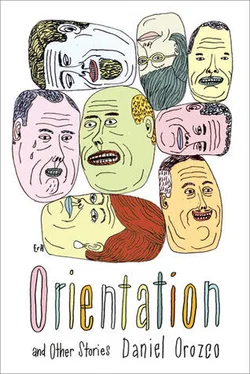She watches his eyes shift, sees them sharpen and glimmer for a moment as he takes in what she has just told him. And then he is Osvaldo again, brash and gay, slapping his palms on the counter, changing the subject. He tells her about a fender bender in front of his kiosk that morning, about the drivers who got out of their respective cars to confront each other. They were veterans of the Chaco War, old men in their seventies, wearing identical medals on their dark wool suits. They stumbled as they took swings at each other and missed, until — exhausted in the midday heat — they collapsed, and Osvaldo had to call an ambulance to haul them away. She loves how he regales in the telling of the incident, whether it happened or not. She is rapt, and hopes that her attention on him will keep him with her a bit longer. But she has given him what he’s wanted. He glances at his watch, slaps his forehead. He remembers an urgent bit of business he must attend to, an errand for a cousin. And then, all showy and clownish, he brings Ynez’s left hand to his mouth. She watches him kiss it. She feels suddenly bereft, lost. The floor beneath her seems to shift and sag. He bids her good night. “Jajoecha peve, Ynez.”
Until we meet again .
And then he is gone.
The evening is clear and cool. The markets and shops have closed, and the cafés are putting up their chairs. The boulevard teems with late-night strollers slowly heading home. Cook joins them. Her route back to the villa is a riot of plumeria in full bloom. The air is glutted with fragrance. Sagging branches overhang sidewalks everywhere. Spatulate petals reach down fat and heavy into her face. She swats them away.
She waves to the guard in the guard booth. He waves back. Inside her apartment, she drops her bag and kicks off her shoes. She stares at a piece of honey cake wrapped in wax paper on the nightstand. She picks it up and goes outside. She walks to the iron fence that borders the cañón and kneels down. She squeezes the honey cake between her hands and waits. The kennel master has told her not to risk this, has warned her that his children are unpredictable, that they can be capricious and willful.
Soon the dogs come, pounding through brush, slamming into the fence, taking the cake from her. There is the snuffling of the dogs and the sound of their tongues on her, and then another noise, somebody speaking to her. She turns around. It is the patrón , barking at her in English. He stands there in his stocking feet, with his belt undone and a chicken leg in his hand. Here is the man who tossed handcuffed prisoners out of airplanes over the Pacific Ocean, the man who invented this innovation for disappearing dissidents. Here he stands, shouting about who knows what, wagging a chicken leg at her. She watches a trickle of blood thread down his forehead. An omen, she thinks. She gazes at him. She feels nothing. She will perhaps feel nothing for a long time. Except maybe for these dogs. She turns to them now, watches their fat pink tongues flicking out of the bushes between the iron pickets, rasping at her fingers and palms and doing a thorough job of cleaning her hands.
* * *
At dusk, the dogs are loosed. The sun dips below the ridge behind the villa, a photosensor engages an electric switch, and the kennel gate swings open. The two rottweilers set off separately, bounding over root and tree-fall and crashing through sedge and bramble until they join each other in a defile that cuts to the top of the ridge. They piss along the perimeter of the cañón fence, metal chain-link topped with boas of razor wire. They gallop back and forth along the ridge — lunging, tongue-lolling lopes. Paladino, the younger, harries Cerbero, nipping and snarling at him, always testing the older dog. They settle down and linger here in the waning light, splay-legged and slit-eyed and content, their massive skulls bobbing, their damp noses twitching at the verdant rankness of Asunción — acrid smoke from distant forest fires; musks of sewage and slag from the river, and eddies of sweet decay from landfills; ooze of meat from the slaughterhouse district; the complex admixtures of blossoms and bleach, baked bread and dog shit, mown grass and motor oil. And always, intermingled, the slick and slippery undertow of the collective human scent. Only when it is full-on dark — when the sun has dissolved like a tablet into the Pilcomayo, draining the colors from dusk — only then do they descend from the highest point of the property. Until first light, when they know to return to the kennel before the gates swing shut, the dogs have the run of this cañón . For the next eight or so hours they are free to romp and ramble and hunt and kill.
Guinea pigs are abundant year-round, as are lizards and toads. In summer, animals foraging for food and water come out of the jungle and down from the highlands. They breach the fence, attracted to the mulch of fallen fruit beneath the lime and papaya trees. Armadillos, capybaras, anacondas, a feral cat or two. Once, a tapir, far from its range, a two-hundred-pound calf that broke through and in a panic could not find its way out. It took them all night to chase it down. And once, there was a man, the greasy stink of him coming at them in torrents — the hot scent of prey like a desperate itching in the middle of the brain.
Once a week the master comes. He sweeps out the kennel, refreshes their bedding and their water trough. He brushes each of them, massages their hindquarters. Always Cerbero first. Paladino — patient — waits his turn. The master looks into their ears, checks their teeth, tends the occasional wound. He examines their droppings. He runs them through their commands. Sit! Stay! Catch! Hold! Tear! Finish! Good boy! When they are done, he kisses each of them. He is not afraid. The dogs know this. The scent of the master is neither of predator nor prey, of friend nor foe. He is simply the master. Before he leaves, he reaches into a waxed bag and throws a slab of round steak before each of them. The dogs watch him, mouths shut, eyes steady. On his command, they fall on the meat. They take food from no other.
But there is one other they are drawn to. She is redolent of blood, and deep in the fissures of canine memory lies a trace of what the tang of her blood once meant. (For Cerbero and Paladino are neutered males, and while the madness of the rut is absent, the absence is always present in them — dogs know their balls have been cut off.) It is this trace — the faint and fleeting residues of estrus and the mount — that brings them running. But they take food from her because it is the scent of the master that prevails. He whelms her, and she is steeped in him, and but for that, they would not come to her and gift her with their gentle mouthings. But for that, they would instead do all they could to clamp down on her hands and pull her in chunks through the cañón fence.
* * *
The Presidente-in-Exile is bleeding.
He holds a blood-dappled monogrammed hankie to his head. The cut is above the hairline, a tiny wound, but a real bleeder. He has just gotten home, flung his coat off, kicked off his pee-splashed Berluti mocs. He stands in front of the portable Sony in the kitchen, looking at a documentary — a history of the War of the Triple Alliance. In 1864, Francisco Solano López, third president of the Republic, invaded Brazil, then declared war on Argentina and Uruguay, engaging in a doomed six-year campaign that wiped out two-thirds of the population; by 1870 there were only thirty thousand men left in all of Paraguay. The debacle is rendered in history as a glorious act of national pride and will, and the ten-part documentary about it is aired on state television again and again. Aside from World Cup soccer in the summer and Miss Universe and the Oscars in the spring, television in Paraguay is a tedious déjà vu zone, awash in reruns of Stroessner’s inaugural addresses and cooking shows from Argentina ( ¡Mundo de bistec! ¡Barbacoa loco! ) and American sitcoms ( Hogan’s Heroes, Green Acres, Happy Days ). And of course, the War of the Triple Fucking Alliance.
Читать дальше












